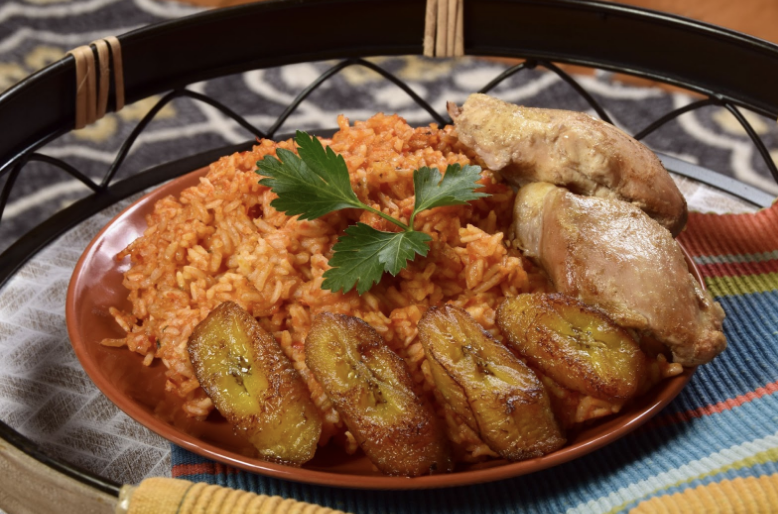
By Max Orr
On April 9, Ghanaian researcher, project management and business consultant Gertrude Mawuena Goh spoke to students and faculty in the Rotunda with her talk entitled “Jollof Wars: A Rice Dish, Digital Debates and the African Diaspora”. The event was a joint effort between the Office for International Programs and the Department of African American Studies, with opening remarks from Dr. Professor LaToya Brackett. The event was a part of Goh’s larger visit to the US, alongside Dr. Brackett’s nationwide conference tour. Attendees sampled two types of Jollof rice, one from Senegal and the other from Ghana. The event was an opportunity to create a community around two common ideals: great food and great conversation.
Jollof rice originated in the region that is part of modern Senegal. It is most often made with long-grain rice, tomatoes, onions, chilis and spices, and optional meat and other vegetables are added depending on the region. Many countries and regions of the world boast a famous rice dish. Jollof rice has become synonymous with West African cuisine, as fried rice is to East Asian cuisine, paella to Spain, biryani to India and risotto to Italy. Its iconic status in West African culture is furthered as Jollof varies wildly across the region. Every country from Senegal to Cameroon has a preferred method of preparation and ingredients that its citizens take great pride in.
‘Jollof Wars’ refers to the often-intense online discourse that occurs as a result of differing Jollof recipes. The viral phenomenon began on X, formerly known as Twitter, as a debate between Ghanaians and Nigerians over which version of the famous dish is better. Since then, almost the whole of West Africa has joined the fun, advocating for why they think their combination of rice, tomatoes and spices is the best. While the term ‘war’ may imply negativity, Goh emphasized the playfulness of the online debates. “When we hear about war, we associate wars with death, the destruction, sorrow, pain, anger and all the sad things. Jollof Wars is nothing like that.” This online phenomenon has spawned everything from food festivals to credit card commercials, and has successfully introduced West African cuisine to a much larger audience. It has even earned its own holiday. World Jollof Rice Day is celebrated each year on Aug. 22.
The virality of the Jollof Wars has brought new attention to the cuisine and culture of West Africa and has fostered new connections across the world. Dr. Brackett first established a working relationship with Goh in 2021 when travelling to Ghana for her ongoing project entitled “African Hair Stories.” Though her original intention was her research project, Dr. Brackett found herself connecting with Goh over food. “It starts communications, right?” Dr. Brackett said. “When people realize you’ve tried something from their culture, and I travel quite a bit, not just the continent for a year, people care about the fact that – especially as Americans, not the best travelers – when you show interest and like you really paid attention to something, they’re like, ‘Okay, you’ve tried this, and how did you like it?’” Food can be a great unifier – Dr. Brackett called it the “universal cuisine” – as it is often among people’s first introductions to a new culture. It can also build community among diasporic communities who have been disconnected from their native cultures.
“Jollof Wars: A Rice Dish, Digital Debates and the African Diaspora” was an evening of community, great food and education. Students and community members enjoyed sampling the famed dish while having cultural conversations that broadened their worldview. Goh continues to work with Dr. Brackett on their ongoing African Hair Stories project and speaks across both the United States and Africa. Below is Goh’s recipe for a basic Ghanaian Jollof Rice. She encourages customization with your favorite protein and vegetables, or shito, a spicy pepper relish native to Ghana.
Ghanaian Jollof Rice Recipe by Gertrude Mawuena Goh
Ingredients:
Long Grain Rice
Tomato paste
Fresh Tomatoes
Onion
Spices
- Ginger
- Garlic
- Cayenne pepper or kpakposhito (habanero pepper)
Protein of choice
Vegetable oil
Salt
Preparation Time: 1 hour
Cooking Time: 2 hours
Cleaning time: 30 mins
Total Time: 3 hrs, 30 mins
Step by Step:
- Prep your ingredients and workspace.
- Cut onions and tomatoes, and grind all spices.
- Put your saucepan on the stove, and add some vegetable oil.
- Add your cut onions, allow it to fry until you smell the aroma, then you add your spice to fry for 3 minutes.
- Add your fresh tomatoes, and allow it to fry on medium heat for 15 minutes.
- Add tomato paste, and allow it to summer until you are unable to taste the rawness of the tomato paste.
- Add salt, washed rice and enough water to cover and settle on top of the rice.
- After boiling, reduce the fire to the lowest level.
- Cover your saucepan with parchment paper/aluminum foil.
- Stir as often as required until well cooked.
